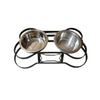Cat Body Language can tell you all the symptoms because not only do fleas cause discomfort and irritation to our feline friends, but they can also lead to more serious health issues if left untreated. Fortunately, there is a wide range of flea medications available on the market, some of which require a vet prescription, while others are accessible over the counter. In this blog post, we'll explore the best flea medicines for cats without vet prescriptions, as well as vet-recommended treatments for effective flea control.
Flea Medications Without Vet Prescription
Here are best flea treatment for cats without vet prescription:
Topical Treatments
Topical flea treatments are applied directly to your cat's skin, usually between the shoulder blades or along the back. These treatments work by spreading over the skin's surface and being absorbed into the oil glands, where they are released gradually to kill fleas and prevent reinfestation.
Advantage: Topical treatments come in convenient applicators, making them simple to administer. They start killing fleas within hours and provide continuous protection for up to a month. Many topical treatments are water-resistant, allowing cats to bathe or swim without compromising effectiveness.
Common Ingredients: Imidacloprid is a commonly used insecticide that targets the nervous system of fleas. Pyrethroids are synthetic chemicals derived from natural pyrethrins, which are insecticidal compounds found in chrysanthemum flowers.
Oral Medications
Oral flea medications are pills or tablets that your cat ingests. These medications work by circulating in the bloodstream and killing fleas when they bite your cat. Capstar flea treatment for cats is one of the most effective oral medications.
Advantages: Oral medications eliminate the need for topical application, which can be messy or difficult with some cats. Some oral medications not only kill adult fleas but also disrupt the flea life cycle, preventing eggs from hatching. Oral medications are convenient for households with multiple pets, as there's no risk of topical treatments transferring between animals.
Common Ingredients: Lufenuron is an insect growth regulator that inhibits the development of flea eggs, preventing them from hatching. Nitenpyram is a fast-acting insecticide that kills adult fleas within hours of ingestion. Spinosad is a natural substance derived from soil bacteria that kills fleas by targeting their nervous system.
Flea Collars
Flea collars are worn around your cat's neck and release active ingredients that repel and kill fleas. These collars offer continuous protection against fleas and ticks for several months.It is one of the best flea medicines for cats without vet prescription.
Advantages: Flea collars provide extended protection, often lasting several months, making them a convenient option for pet owners. Once fitted, flea collars require little maintenance compared to topical treatments or oral medications. Flea collars are generally safe for most cats, including kittens, and don't involve the risk of accidental ingestion.
Common Ingredients: Often used in flea collars, Imidacloprid targets the nervous system of fleas. Flumethrin is another active ingredient commonly found in flea collars, which works synergistically with imidacloprid to provide comprehensive flea control.
Vet-Recommended Flea Treatment for Cats
Here are vet-recommended flea treatment for cats:
Prescription Topicals
Some flea medications, like Revolution and Bravecto, require a prescription from a veterinarian. These products often contain additional active ingredients for comprehensive flea control and may be recommended for cats with severe infestations or underlying health conditions. Prescription topicals are typically more potent and long-lasting than over-the-counter options, making them suitable for cats with persistent flea problems. They are very effective vet-recommended flea treatment for cats.
Professional Flea Treatments
In severe cases of flea infestation, veterinarians may recommend professional flea treatments, such as flea baths or sprays. These treatments are administered by trained professionals and can effectively eliminate fleas from the cat's environment. Professional flea treatments may be necessary for cats with flea allergies or secondary skin infections caused by flea bites.
When it comes to choosing the best flea medicines for cats without vet prescription, it's essential to consider factors such as the severity of the infestation, your cat's health status, and their individual preferences. While over-the-counter flea medications provide accessible options for cat owners, vet-recommended flea treatment for cats offer additional potency and efficacy, particularly for severe infestations. Consulting with a veterinarian can help determine the most suitable flea control strategy for your feline companion, ensuring their comfort and well-being. Follow PetYupp for more informative articles regarding pet health.





Leave a comment